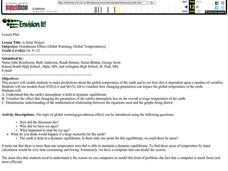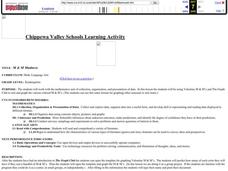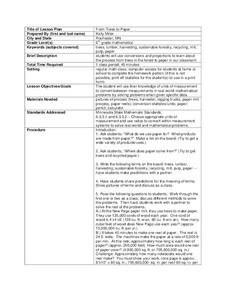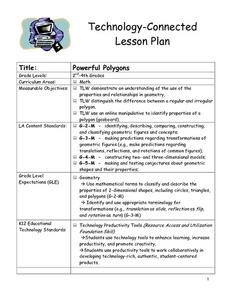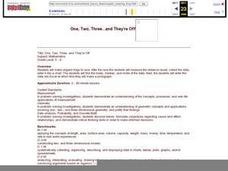Curated OER
A Solar Project
Students make predictions about the global temperature of the earth and to see how this is dependent upon a number of variables. Students visualize how changing parameters can impact the global temperature of the earth.
Curated OER
Secrets Beneath the Waters
Students work in small groups and design a ship out of balsa wood. They hypothesize what happens when the ship is placed in water then make predictions as to which ship stays afloat the longest with the greatest amount of weight added.
Curated OER
Investigation - Patterns
Learners create a pattern out of pattern blocks. In this math lesson, students work with a partner to investigate the pattern they have. Within that group, learners continue to design the pattern by adding the next two pieces....
Curated OER
Population Pyramids
Students work with and make population pyramids. In this population pyramid lesson, students use census data to make population pyramids for China, India, and the United States. They use the information to determine why jobs are leaving...
Curated OER
Spaghetti Graphs
Students work in pairs to test the strength of spaghetti strands. They collect and graph data to determine a line of best fit. Students create a linear equation to interpret their data. Based on the data collected, students predict...
Curated OER
M & M Madness
Students work with the mathematics unit of collection, organization, and presentation of data. For this math and technology lesson plan, students use Valentine M & M’s and The Graph Club to sort and graph the various colored M &...
Curated OER
From Trees to Paper
Sixth graders investigate logging and the process of paper making. In this forestry lesson, 6th graders analyze pictures of trees being processed into the paper they use everyday. Students solve and create math problems based...
Institute of Electrical and Electronics Engineers
Design and Build A Better Candy Bag
Young scholars discuss how the final design for a product can affect its success. They work together to design and develop a better candy bad. They predict the volume and strength they need for the bag to be successful.
Curated OER
Picking Pythagoras
Students discover that side measurement is used in determining angle classification of a triangle. By squaring sides, they predict whether triangles be right, obtuse, or acute. They prove the Pythagorean Theorem and use it to solve...
Curated OER
Grade 1: More Land or Water?
First graders listen as the teacher reads a story involving cross-continent traveling. Students collect a random sample by tossing an inflatable globe and recording whether they touch land or water each time they catch the globe in order...
Curated OER
Dragon Boats
Students create a model boat. In this art lesson, students identify what makes a boat float and use milk cartons to create their own boat.
Curated OER
The Geometry of Real Images
In this math worksheet, high schoolers read the examples for using the techniques of mathematical modeling. They draw the angles in order to simulate the reflection of light while using a concave mirror.
Curated OER
Probability Using M&M's
Students estimate and then count the number of each color of M&M's in their bag. In this mathematics lesson, students find the experimental probability of selecting each color from the bag. Students create pictographs and bar graphs...
Curated OER
Strike a Pose: Modeling in the Real World (There's Nothing to It!)
Adjust this lesson to fit either beginning or more advanced learners. Build a scatter plot, determine appropriate model (linear, quadratic, exponential), and then extend to evaluate the model with residuals. This problem uses real-world...
Curated OER
Rep Tiles
Third graders use pattern blocks of one shape at a time to try to create a similar shape. They compare the perimeter of the new figure with the perimeter of the original shape and look for a pattern. Students use the pattern to predict...
Curated OER
Significant What?
High schoolers define accuracy and precision, and differentiate between the two terms, apply the concepts of accuracy and precision to a given situation and correctly apply the concept of significant figures to measurement and...
Curated OER
Shop 'Til You Drop
Students compare food prices to find the lowest unit price and make choices about where to shop and what to purchase on weekly items, cost comparisons and items needed. They collect grocery ads and weekly sale flyer's to expedite their...
Pennsylvania Department of Education
Equal Groups
Students explore statistics by completing a graphing activity. In this data analysis lesson plan, students define a list of mathematical vocabulary terms before unpacking a box of raisins. Students utilize the raisins to plot data on a...
Curated OER
Powerful Polygons
Students scan the classroom to find different common shapes. They listen as the teacher defines polygon and regular polygon. The teacher demonstrates regular polygons via the Internet and the "Math is Fun" web site. Students go outside...
Curated OER
Oscillations
Students construct and compare the actions of various pendulums. For this pendulum motion lesson, students build and test different types of pendulums. They conduct experiments with the length of the swing arm and apply mathematical...
Curated OER
Harnessing Wind
Students explore the ways that engineers study and harness the wind. They study the different kinds of winds and how to measure wind direction. In addition, students learn how air pressure creates winds and how engineers build and test...
Curated OER
LET'S PARTY!
Students identify a number pattern and extend the number sequence. They make generalizations given a specific pattern and create, describe, and extend patterns. They create a table that describes a function rule for a single operation...
Curated OER
Not Everything is More Expensive
Students compare prices and determine percent increases and decreases of items in order to make wise purchases. In this percent increases and decreases lesson plan, students calculate the amounts based on grocery store ads.
Curated OER
One, Two, Three...and They're Off
Students make origami frogs to race. After the race they measure the distance raced, collect the data, enter it into a chart. They then find the mean, median, and mode of the data. Next, students enter this data into Excel at which time...


